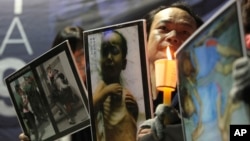The United States is fully committed to an effective response to North Korea's atrocious human rights record. “This year marks a milestone for U.S. policy regarding human rights in North Korea,” said Deputy Assistant Secretary for Democracy, Human Rights, and Labor Scott Busby.
North Korea is one of the world’s most repressive countries. Under its leader Kim Jong Un, the totalitarian regime dominates every aspect of its citizens’ lives. North Korean authorities commit egregious human rights violations, including extrajudicial killings, enslavement, torture, and prolonged arbitrary detention. It is estimated that the regime has locked away between 80,000 to 120,000 citizens in its vast network of political prisons. Many of these inmates are reportedly subject to torture of all kinds. Women prisoners have suffered forced abortions and have been forced to watch the infanticide of their newborn infants. “These reports are deeply disturbing, and we condemn the North Korean government for its use of fear and cruelty to control its people,” said Deputy Secretary Busby.
The U.S. strategy to counter such violations in North Korea focuses on three key objectives. First, the U.S. seeks to increase international awareness of the dire human rights situation in North Korea. This includes amplifying the voices of defectors by sharing their stories and experiences under the oppressive North Korean regime.
The second part of the strategy is to increase access to information for as many North Koreans as possible. To do this, the U.S. has partnered with defector-led organizations to push information into North Korea through networks built around the information markets.
The final part of the strategy is accountability. As part of this effort, the U.S. released a report last July identifying eight entities and 15 North Korean officials, including Kim Jong Un, who are responsible for or associated with serious human rights abuses and censorship.
The United States will continue to let the North Korean regime know that any future relationship depends in part on the regime taking steps to improve its human rights record. In the meantime, the U.S. will seek every opportunity to give a voice to the voiceless and remind the North Korean people that they are not alone and are not forgotten.














